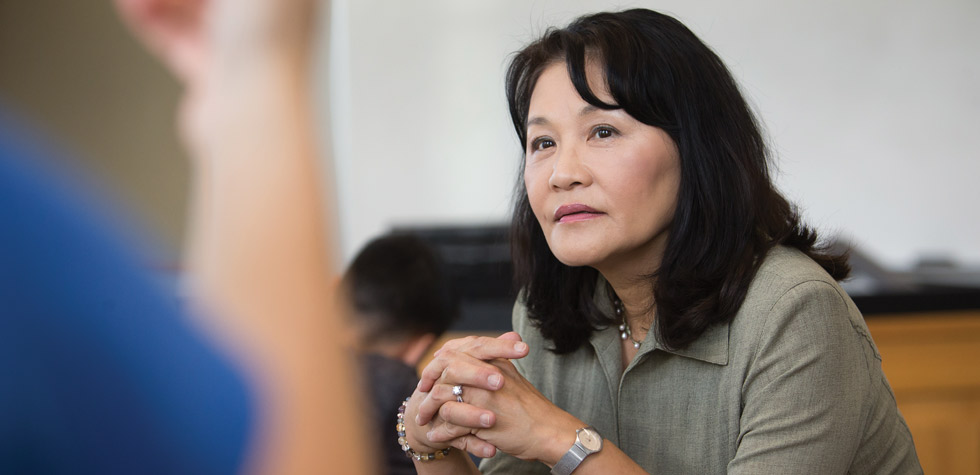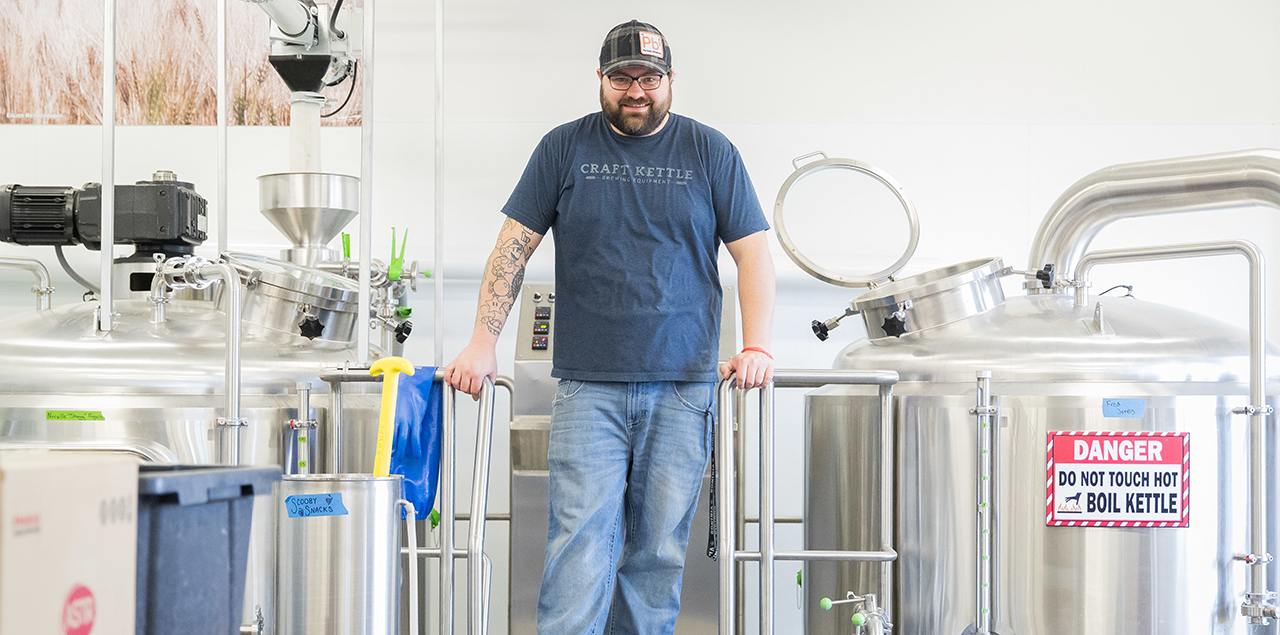
Associate Professor Keiko Krahnke lives and teaches ethics, sharing her insights with UNC business students
Every night after teaching at UNC, Keiko Krahnke drives west to her home nestled among the hills, rocks and canyons of Masonville, where the distant city lights cannot diminish the stars.
Though she has Wi-Fi, there’s no cell phone service here. Her horses wait for her another half-hour away, or she can go for a walk, where she sees deer among the foothills or even a bear on occasion.
She can take off her shoes, just how she learned at her home in Japan, and sit in her living room, a room full of windows twice as tall as her to let in the soothing starlight.
This is a place where she can quiet her mind and try to leave the world to its own devices.
Though she says, over and over, she isn’t a business person, Krahnke teaches ethics as an associate professor of management and business communications at UNC’s Monfort College of Business. It’s how she helps save the world.
Businesses from Volkswagen to Wells Fargo have been gaining plenty of front-page space for unethical business practices. A Gallup poll conducted in early 2016 reported that only 17 percent of Americans gave business executives a “high” rating for honesty and ethics.
Krahnke’s efforts to help students cultivate ethical behavior is a critical part of a UNC business education, and Krahnke is an advisor (with colleague Sharon Clinebell) for the UNC Ethics team. She focuses on helping her students see their responsibilities as future leaders and understand the impact their choices can have in the world. She encourages them to think beyond their own actions — to see the interconnectedness of the world — in subtle situations in the business world.
In some ways, businesses are arrogant, Krahnke tells her Business Ethics class early in the fall semester. “They think of ways to help themselves. They see themselves as the center.”
Krahnke’s goal is to help her students think about a more holistic vision of business — a vision that’s not centered on themselves, or the place where they work or one day could lead.
“I want you to think about the world as a system and not a machine,” she says to them. “If you want to become a leader, you have to be a human before you can become a leader.”
It’s a vital lesson, says Paul Bobrowski, dean of the Monfort College of Business. “Companies only have their product and their reputation,” he says. “If you don’t have that, you’re losing value for your employees and for your shareholders.
She’s Reaching Her Students
Krahnke said she worries about whether her beliefs about business ethics are reaching
her students. The results of student teams from her UNC classes in business ethics
competitions show that she is.
- A team from her class won the Daniels Fund Ethics Initiative Consortium Case Competition in 2016 competing against 10 teams that included Colorado State University, the University of Colorado Denver, the University of Denver, New Mexico State University, the University of Wyoming and the University of Utah.
- The UNC team took third place in the 2015 competition, posting the top finish among
Colorado schools.
In 2014, the UNC team won the Phillips 66-Enactus Business Ethics Case Competition against teams from Texas A&M, Truman State University, the University of Oklahoma and Iowa State University and host school Kansas State University. - Teams from Krahnke’s class also regularly take top honors for their papers and presentations nominating companies for the Torch Award for Ethics from the northern Colorado and Wyoming chapter of the Better Business Bureau, competing against teams from CSU and the University of Wyoming.
UNC’s emphasis on promoting business ethics education is made possible by the Daniels Fund’s generous investment in the Daniels Fund Ethics Initiative.
“Cheating on a test is pretty obvious, but cheating can mean something else in the business world,” Bobrowski says. “It might not even appear to be cheating.”
Krahnke says many businesses still view the holistic approach as weak, but it can be beneficial to all, even profitable, she says. There’s a restaurant in Japan that she loves to visit. The owner knows where the fish are caught in a sustainable manner, and he likes to promote all the restaurants that operate near him. It helps everyone that way. People will visit the district and come back if they like one place, he said. Maybe they will try his place next time.
“We are taught that you have to compete,” Krahnke said. “But the most successful companies have CEOs who say we do not compete.”
In her book, Organizing Through Empathy, which she co-authored with Kathryn Pavlovich, Krahnke writes about “transcendant empathy” — the “ability to see the larger system.”
“Empathy,” Krahnke says, “is the force that makes a community whole through recognizing the interconnectedness and interdependencies among us, rather than it being merely a collection of individuals.”
Being able to see the “interconnectedness” of the world can change how corporate leaders do business. Krahnke and Pavlovich offer multiple examples in their book, writing, “In a global marketplace, it’s not always easy to know where or how the products we use every day have been produced. … It is ironic that a garment that carries a tag that says, ‘a portion of the proceeds go to help children in need’ may have actually been made by a child in need.”
If her approach seems idealistic, students soon begin to see its practical, successful applications. Krahnke points out that when the “fair-trade” concept (assuring living wages for producers) began nearly 20 years ago, its viability may have seemed dubious to some in business. Yet fair-trade coffee, says Krahnke, became the fastest growing segment of the industry, hampered more by supply than demand.
Businesses that act responsibly have found that it can be an effective marketing tool. Patagonia, the outdoor gear and clothing company, has long talked about operating in a sustainable manner and devoted millions to outdoor and environmental causes. Other outdoor companies have followed, either because they want to or because they recognize that Patagonia may be appealing to an audience that values outdoor stewardship.
“We’re seeing that more and more,” says Don Gudmundson, who was the MCB dean from
2008 to 2013 and still teaches as a professor. “Corporations are still driven by the
quarterly numbers and the stock market.
But they’re trying to balance that.”
“It takes a special skill to look beyond those quarterly reports, and Krahnke is ideal for that job. It’s perhaps better that she does not consider herself a business person,” Gudmundson says.
“I think people respect her views and her willingness to have them and share them,”
he said. “In reality, business is based on many other disciplines.”
As proof, Krahnke now chairs the management program at MCB. “That’s not typical, at
all, to be chair of a department in a business school if you weren’t in the business
world,” Gudmundson says.
Krahnke earned her bachelor’s in English from Doshisha Women’s College in Japan, and
her master’s in English and Ph.D. in Human Resource Development from Colorado State
University. She came to see her role as a teacher as one that could address the need
for ethics and empathy in the world.
When Krahnke returns to the refuge of her peaceful home in Masonville, she doesn’t
leave the lessons of ethics in her classroom. It’s an intrinsic part of her life,
and central to her character since her childhood in Japan.
When she was a tiny girl, she saw a program on TV about a hunter who was going to
kill a bear, and she banged on the TV and said “No, No, No!” Her favorite day of the
year was New Year’s Day because all the stores were closed, and they didn’t sell meat,
and so she thought it
was the one day of the year when nothing was killed.
She worried constantly about the world and the injustices it presented to animals and the unfortunate others who didn’t have food or comfort or shelter.
Her empathy and sense of justice have formed her view of the world and the actions she takes. She’s worked hard on behalf of animals and their treatment, rescuing many animals, of many different stripes. Horses, goats, dogs — they have an esteemed, beloved place in her life. She adopted greyhounds back in the 1980s, when many people didn’t know their cruel fates after their racing careers ended, and before rescue organizations began to pop up and offer adoption.
She’s not afraid to show her students how she lives her life or her beliefs. In fact, she’s proud of them.
“One of the biggest compliments I receive from my students is when they tell me, ‘You’re the same person (outside the classroom) as you are in the classroom,” Krahnke says.
Krahnke admits she’s a dreamer, an optimist, someone who likes to work things out diplomatically. She can’t change people, she said, but there’s power in inviting people to see another side to their own beliefs.
“That’s the art of communicating,” she said. “If you tell them they’re wrong, they will shut down. But if you just say, ‘How about this?’ sometimes they will reconsider.”
But she also loves to acknowledge a contradiction about her. She is, she says, “very much a samurai.”
She likes and admires the samurai’s unwavering principles. She enjoys Japanese archery, and though she does practice shooting targets, she does it for the focus it requires. It teaches her to empty her mind.
But she also likes the fierceness a samurai will employ to defend those principals.
“I don’t like to get into an argument, and I prefer compassion and kindness,” she said. “But when I have to fight, I know how to fight.”
Still, Krahnke worries about the world, and she worries that the students she’s throwing back into it, the future generations who will one day rule it, may not listen to her. She wonders if she’s reaching them.
Even so, there’s a part of teaching that she finds especially gratifying, and it’s why she does it rather than lead an organization to save animals or work for a nonprofit. Graduates will come back to visit her, and when they do, sometimes they say something that will help her relax in her living room just a little better when she goes home to Masonville for the night.
“They tell me that they’re making a difference,” Krahnke says. “That’s my favorite part of my job.”
This story by Dan England appeared in the fall/winter issue of UNC Magazine.
More Stories
-
MCB Students Gain Pathway to Career-Ready Resources
Este artículo no está en español.
-
Launching a Career at the Start
Empezando una carrera como emprendedor
-
Cheers! Brewing Program Taps into Local Partnership to Sell Beer
Este artículo no está en español.
-
NSF Grant to Focus on Entrepreneurship, Workforce Resilience and Development along Colorado's Front Range
Este artículo no está en español.





